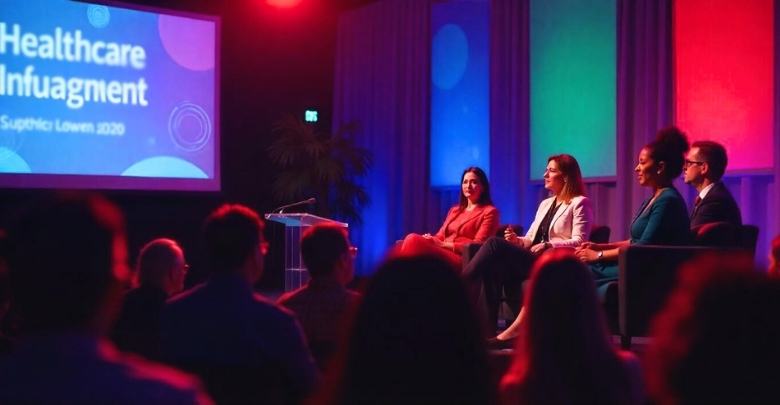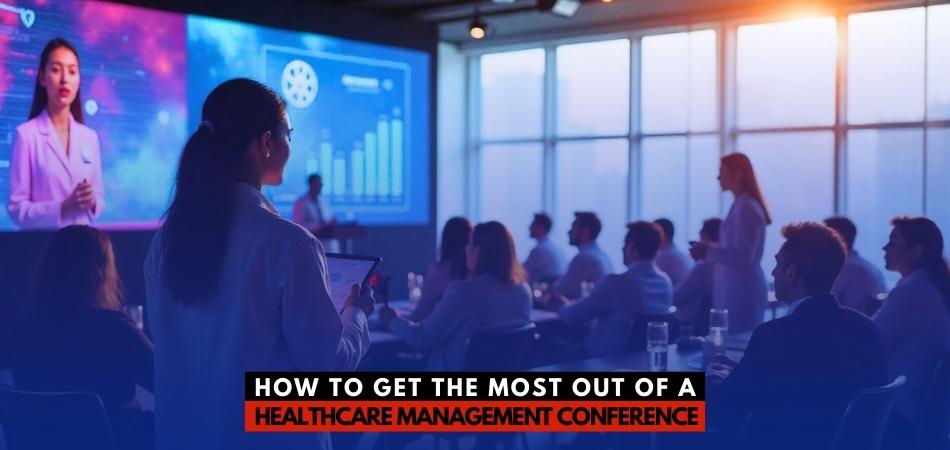There are many benefits that are associated with healthcare management conferences, such as the opportunity to connect, learn, and grow in an ever-evolving industry. These events are designed to inspire innovative ideas and encourage collaboration among peers. If you’re wondering how to get the most out of a healthcare management conference?
Start by setting clear goals to define what you want to achieve. Actively engage in sessions to absorb key insights and network with both peers and speakers to build meaningful relationships. Following up post-conference is also crucial to strengthen those connections and effectively apply what you’ve learned.
Read on to discover more strategies that will boost your conference experience and help you maximize its value.
Importance of Healthcare Management Conferences
Healthcare management conferences are essential for professionals to stay informed and connected in the industry. These events provide opportunities to learn about the latest trends, advancements, and best practices. Attending also promotes a deeper understanding of how to address pressing healthcare challenges effectively.
Connecting with other healthcare professionals at conferences creates valuable networking and collaboration opportunities. Professionals can share experiences, discuss industry changes, and explore innovative solutions to common issues. The connections built here often lead to partnerships that benefit healthcare institutions and the communities they serve.
Participating in a global event such as a healthcare management conference in Canada or other major hubs opens doors to diverse perspectives and insights. The discussions and workshops promote skill-building, allowing attendees to enhance their expertise. This knowledge equips professionals to improve healthcare management and patient outcomes in meaningful ways.
What to Expect at a Healthcare Management Conference?
Participating in a healthcare management conference can be an invaluable experience for professionals in the field. These events provide a platform for sharing insights, discussing challenges, and networking. Here’s what to expect when you attend one.
- Keynote Speeches: Influential leaders will deliver speeches on the latest trends in healthcare management. These presentations offer insights into future industry directions and innovations.
- Breakout Sessions: Interactive sessions allow attendees to explore specific topics in depth. These are smaller, more focused discussions facilitated by experts.
- Panel Discussions: Panels feature a variety of experts debating current challenges and solutions in healthcare. Attendees can gain multiple perspectives on crucial issues within a single session.
- Networking Opportunities: Conferences serve as a great place to meet peers and leaders from across the industry. Structured networking events facilitate connections that can lead to future collaborations.
- Exhibitions: Latest technologies and solutions are showcased by vendors in the healthcare sector. Attendees can see demonstrations and discuss products directly with providers.
- Workshops: Practical workshops focus on skill development in areas like leadership and data analytics. These sessions provide tools and techniques that can be immediately applied in the workplace.
- Research Presentations: New studies and findings are presented by researchers and academics. This is a chance to learn about the latest evidence-based practices and data-driven strategies.
- Continuing Education: Many conferences offer credits for professional development and continuing education. Participants can fulfil requirements while staying updated on industry standards.
Who Gained Most From Attending a Healthcare Management Conference?
Healthcare management conferences bring together diverse professionals eager to deepen their industry knowledge. These events offer valuable insights, practical skills, and networking possibilities. Here’s a closer look at who benefits most from attending.
Healthcare Administrators
Healthcare administrators gain strategic insights that improve organizational efficiency and quality of care. They can learn effective techniques for managing resources and streamlining processes. Networking with peers helps them share challenges and discover innovative solutions. Administrators also stay informed on regulatory changes impacting healthcare operations.
Clinical Managers
Clinical managers benefit by learning about advanced care delivery models and patient-centered practices. Sessions often cover evidence-based strategies to enhance patient satisfaction and safety. Interacting with experts helps them adopt best practices in clinical workflow management. Clinical managers leave with practical tools to improve team productivity and care quality.
Policy Makers and Regulators
Policy makers and regulators find value in understanding emerging healthcare trends and technological advancements. This knowledge enables them to make informed decisions and create relevant policies. Conferences also provide insights into global healthcare standards and their applications. By engaging in discussions, they strengthen regulatory frameworks that benefit the public.
Technology and Innovation Leaders
Leaders in healthcare technology and innovation gain insights into new digital tools and trends. Exhibitions and demos showcase the latest solutions transforming healthcare management. As conferences take place worldwide, discovering healthcare management opportunities in Canada or similar regions can inspire localized innovations. These events enable leaders to connect with providers seeking tech-driven healthcare improvements.
Students and Emerging Professionals
Students and new professionals find opportunities for learning and mentorship at these conferences. Exposure to industry trends prepares them for future leadership roles in healthcare. Engaging with seasoned professionals offers networking that could lead to internships or jobs. They leave with practical knowledge and industry contacts that support their career growth.
How to Get the Most Out of a Healthcare Management Conference?
You can expand your knowledge and network by attending a healthcare management conference. To make the most of your experience, you need to take a few strategic steps before, during, and after the event. Here’s a guide to help you gain maximum value from your time.
Step 1: Define Clear Goals
Start by identifying your objectives and what you want to achieve from the conference. Whether it’s learning specific skills or networking with industry leaders, having clear goals will keep you focused. These objectives should align with your career path or organizational needs. Goal-setting helps you prioritize sessions and activities that meet your ambitions.
Step 2: Plan Your Schedule
Look at the conference agenda and choose sessions that match your interests and goals. Plan ahead to avoid missing key presentations or workshops. Highlight times for networking or Q&A opportunities to make meaningful connections. A well-planned schedule allows you to maximize learning opportunities without feeling overwhelmed.
Step 3: Actively Participate in Sessions
Engage fully during sessions by taking notes and asking relevant questions. Active participation helps you absorb information more effectively and retain key insights. By interacting with speakers, you can gain deeper insights and practical takeaways. This involvement also showcases your genuine interest to peers and presenters alike.
Step 4: Network Strategically
Seek opportunities to network with both peers and industry experts during breaks and social events. Approach people with a clear idea of the connections you’re hoping to build. Meaningful conversations can lead to future collaborations or mentorship possibilities. Networking strategically strengthens your professional circle and fosters supportive relationships.
Step 5: Take Time to Reflect and Summarize
After each session, reflect on key takeaways and jot down useful ideas. Summarizing information reinforces learning and helps you remember valuable insights. This reflection can guide you in implementing practical changes post-conference. Organizing your thoughts afterwards makes applying new knowledge much easier.
Step 6: Follow Up Post-Conference
For building lasting professional relationships, it’s crucial to connect with people you meet after a conference. Send follow-up emails to express gratitude and keep the conversation going. This step reinforces your connections and opens doors for future collaboration. Additionally, revisit your notes to integrate learned concepts into your work.
Common Mistakes to Avoid at Healthcare Conferences
Healthcare conferences offer a wealth of learning and networking opportunities. However, common mistakes can limit your ability to benefit fully. Here’s a guide to help you avoid these pitfalls and make the most of every event:
- Skipping Preparation: Not setting goals before the conference can lead to wasted time and missed opportunities. Identify sessions aligning with the purpose of healthcare management conferences and personal goals.
- Ignoring Networking Opportunities: Some attendees miss valuable connections by not actively engaging with peers and industry experts. Building professional relationships is essential for long-term benefits and future collaborations.
- Overloading Your Schedule: Attending back-to-back sessions can lead to exhaustion and reduced focus on critical topics. Prioritize quality over quantity by selecting key sessions that matter most.
- Failing to Engage in Sessions: Passive listening without note-taking or interaction limits retention and practical application. Engaging in discussions ensures you gain deeper insights and leave with actionable ideas.
- Forgetting to Follow Up: Many neglect post-conference follow-ups, missing out on solidifying new relationships. Sending timely messages to new contacts helps build lasting professional connections.
- Not Reviewing Conference Materials: Ignoring handouts and presentations after the event means losing valuable resources for future use. Review materials to reinforce learning and implement insights into your work.
Essential Tips to Follow Up After the Conference
Following up after a conference is crucial for making the most of your experience. It solidifies new connections, reinforces insights, and opens doors for future opportunities. Here are essential tips to ensure a successful post-conference follow-up.
- Send Thank-You Notes: Expressing gratitude to speakers and organizers shows appreciation and strengthens professional relationships. A quick thank-you email can leave a lasting impression on key contacts.
- Connect on LinkedIn: Send personalized LinkedIn requests to individuals you met to keep the connection alive. Mentioning your shared conference experience will remind them of your conversation.
- Review Your Notes: Revisiting notes reinforces what you learned and helps identify key takeaways. Organize insights to implement new ideas or share them with colleagues.
- Share Highlights with Your Team: Discussing key points with your team amplifies the impact of your attendance. Sharing new strategies or insights can benefit your organization as a whole.
- Follow Up on Promises: If you offered to send resources or schedule follow-ups, deliver on these commitments. Honoring promises builds trust and credibility with your new contacts.
- Engage in Social Media Discussions: Joining post-conference conversations on social media allows you to share insights and learn from others. Use hashtags and engage with fellow attendees for broader exposure.
- Set Future Collaboration Goals: Identify potential collaborative projects or learning opportunities with the contacts you made. Setting goals for future engagement ensures your conference connections grow meaningfully over time.
FAQs About How to Get the Most Out of a Healthcare Management Conference?
In healthcare management conferences, professionals can learn, connect, and advance their careers. You can take advantage of these events to gain lasting insights and valuable connections by reading this FAQ.
What Should I Bring to a Healthcare Management Conference?
Bringing essentials like a notepad, pen, business cards, and a mobile charger is highly recommended. These items allow you to stay organized, take notes, and ensure you’re prepared to network and capture insights from every session you attend.
How Early Should I Arrive at Conference Sessions?
Arriving at least 10-15 minutes early is ideal to secure a good seat and settle in. This allows you to network with others before the session begins, helping you make connections in a relaxed, open environment.
What Are the Benefits of Engaging with Speakers?
Engaging with speakers provides a chance to gain deeper insights beyond the session content. Asking questions or following up on key points shows your interest and can help you build a relationship with respected professionals in the field.
How Can I Stay Focused Throughout the Day?
To maintain focus, prioritize sessions, take regular breaks, and stay hydrated. Having a well-paced schedule keeps your energy levels balanced, allowing you to absorb information and network effectively without feeling exhausted.
What’s the Best Way to Take Notes at a Conference?
Taking notes in a structured format, like bullet points or summaries, helps capture key information quickly. Avoid transcribing everything and instead focus on the main takeaways, as this will make reviewing and applying the information easier afterwards.
Conclusion
Conferences in healthcare management offer invaluable opportunities to network, learn, and grow. Attendees can maximize their experience by setting clear goals, planning their schedules, and actively participating in sessions. Networking strategically and following up with new contacts strengthens professional connections that can lead to meaningful collaborations.
If you’re wondering “How to get the most out of a healthcare management conference?”, the key lies in thoughtful preparation, engagement, and a proactive follow-up strategy. Reviewing notes and sharing insights with colleagues extends the conference’s impact, benefiting both individual growth and organizational goals. Taking advantage of conference opportunities with intention is a valuable step toward improving one’s healthcare management career.








